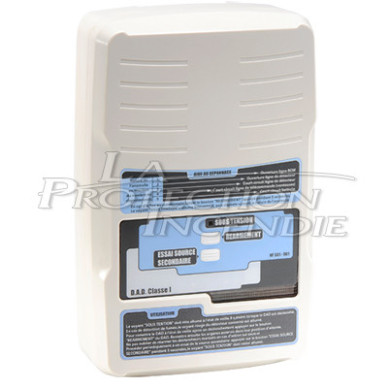


The Autonomous Trigger Detector is an ABS box designed to collect information from the detection heads and manual triggers and automatically control the safety devices linked to smoke evacuation; it accepts up to two detectors, two manual boxes and three slave devices.
| Product | Reference | Landmark | Designation | Price | Availability | Quantity |
|---|---|---|---|---|---|---|
|
0626D
|
- |
In stock
|
||||
|
9601B
|
- |
Price
€93.00
HT
|
In stock
|
|
||
|
9602B
|
- |
In stock
|
||||
|
9695
|
- |
Price
€51.80
HT
|
In stock
|
|
The Autonomous Trigger Detector (DAD) collects signals supplied by detection heads and manual control boxes in order to automatically control servo-controlled devices powered by voltage break, such as fire door closures, smoke extraction devices, smoke vents or ventilation dampers.
The device can receive:
- Maximum 2 Automatic Fire Detectors (AFD) connected in parallel on the detection loop
- 2 Manual Control Boxes maximum (BCM) connected in series on the manual control line
- Control up to 3 servo-controlled devices on the dedicated output, provided that the total power does not exceed 4.5 watts at 24 V.
The maximum cable lengths are indicated at 1,000 meters for the lines concerned and the types of wiring specified in the documentation must be respected. (1 pair of 8/10th type C2 for the DAI and BCM and 1.5 mm² type RO2V cable for the main power supply and the controlled components)
The main power supply must be connected to 230 Vac (+10% / -15% 50 Hz 150 mA).
The secondary power source is provided by two 12V, 1.2Ah sealed lead-acid batteries, providing a stated runtime of 4 hours after a 20-hour charge. The device incorporates deep discharge protection, and it is recommended that the batteries be replaced every two years.
A green "LIVE" indicator light indicates the standby state; its extinction signals the transition to the operating state, for example following the detection of fire, action on a manual box, a detector fault or a fault on a line. The standby state is restored by pressing the "RESET" button after correcting the cause of the triggering.
The secondary source test is carried out by pressing the "SECONDARY SOURCE TEST" button for five seconds: the "POWER ON" indicator light must not go out and the controlled components must remain in the standby position, otherwise replace the batteries and repeat the test after recharging (wait at least four hours if necessary). For each test, check that the indicator light goes out, that the controlled components are released and that they are repositioned after resetting.
The DAD is insensitive to power micro-cuts. It can only control controlled devices that comply with standards NF S 61-937 (DAS) or NF S 61-938 (DAC) and the connected detectors must be certified according to EN 54-5 (For heat detectors), EN 54-7 (For smoke detectors) or EN 54-10 (For flame detectors). If no detector or manual box is connected, certain resistors or terminal block connections must not be removed, in accordance with the connection instructions. Installation and periodic checks must be carried out by qualified personnel.
The case should be cleaned with a dry cloth without using products that could damage the plastic surface. The batteries should be replaced periodically according to the provided recommendation.
In accordance with standard NF S 61-961, the DAD must under no circumstances be used to control automatic extinguishing devices or to provide an evacuation alarm. The same device can control several slave devices for the same room, but it must not control automatic extinguishing equipment.
- Material: ABS plastic
- Height: 258 mm
- Width: 166 mm
- Depth: 82 mm
- Weight: 1,750 kg with both batteries
- Standard: NF S61-961
- Main Power Supply: To be connected (230 Vac +10% -15% 50Hz 150 mA)
- Secondary Power Supply: 2 x 12V, 1.2 Ah sealed lead batteries
- Autonomy: 4 hours (After 20 hours of charging)
- Deep discharge protection
- Recommended replacement frequency: 2 years
- 1 Loop for 2 Automatic Fire Detectors maximum (AFD)
- 1 Loop for 2 Manual Control Boxes maximum (BCM)
- 1 Output for up to 3 controlled devices, max. power 4.5W under 24V (voltage failure)
- 1 Connection loop for remote reset (NO or NC contact)
- Fixing center distance: 226 mm in height, 112 mm in width at the top, 106 mm in width at the bottom
- Protection index: IP42 / IK 07